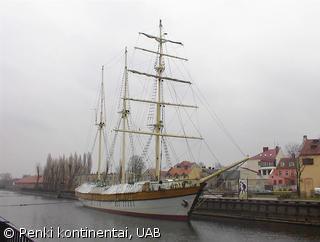LANGUAGE COPS, PARTIES CLASH OVER CAMPAIGN ADS.
Published:
29 September 1999 y., Wednesday
Estoniais language board ordered a Tallinn tram fleet to remove a political advertisement printed in both Estonian and Russian from the exterior of a tram car.The ad, the language board said, violates an election law that requires outside advertising to be printed in Estonian and only Estonian. The ad was placed by the Peopleis Trust, an electoral alliance that comprises several of Estoniais Russian parties. After the tram fleet removed the advertisement, the Peopleis Trust submitted a formal complaint against the language board to the Tallinn Administrative Court. The Estonian language law specifies that "public signs, announcements and advertisements shall be in Estonian." The National Language Board, which is charged with interpreting and enforcing the law, has interpreted this to mean "only in Estonian," excluding the possibility for translations into other languages. Urmas Veikat, assistant to the director of the National Language Board, insists that the wording of the law is quite clear on this point."If the law did allow bilingual signs, then the wording would be ein Estonian and in other languages. As it stands, only Estonian-language signs are allowed. This comes directly from paragraph 6 of the Estonian constitution, which declares Estonian the state language." Representatives of the Peopleis Trust claimed in a public statement Sept.20 that the current interpretation of the law deprives non-Estonian speakers of their right to information. Unlike in parliamentary elections, anyone with an Estonian residence permit has the right to vote in local elections. This includes approximately 300,000 Russian speakers in Estonia. Three Russian electoral unions - groups of parties who present a common list of candidates - are participating in the elections. The issue of Russian-language political advertisements arose during the parliamentary campaign last spring, when the language board ordered the Russian Party in Estonia to remove Russian-language posters. Other printed campaign materials, such as brochures and newspaper ads, may be in any language. The ban on foreign language use also does not include proper names or registered trademarks. The law holds the publisher of the advertisement, in this case the Tallinn tram fleet, responsible for not following the law.
Written by Tricia Cornell
Copying, publishing, announcing any information from the News.lt portal without written permission of News.lt editorial office is prohibited.
The most popular articles
 The twentieth anniversary of the Baltic Way was commemorated in Tokyo.
more »
The twentieth anniversary of the Baltic Way was commemorated in Tokyo.
more »
 After an emotional funeral service in Boston and a 90-minute flight from Massachusetts, the flag-draped casket holding Edward Kennedy arrived by motorcade in Washington, D.C. for a final visit to the U.S. Capitol Building, the political home for the senior Senator of Massachusetts for almost half a century.
more »
After an emotional funeral service in Boston and a 90-minute flight from Massachusetts, the flag-draped casket holding Edward Kennedy arrived by motorcade in Washington, D.C. for a final visit to the U.S. Capitol Building, the political home for the senior Senator of Massachusetts for almost half a century.
more »
 Mike Perham has become the youngest person to sail single handedly round the world. It's also the dream of another teenager in the Netherlands.
more »
Mike Perham has become the youngest person to sail single handedly round the world. It's also the dream of another teenager in the Netherlands.
more »
 Whenever its member countries are hit by natural disasters, the EU steps in to help coordinate assistance and fund the reconstruction of essential infrastructure.
more »
Whenever its member countries are hit by natural disasters, the EU steps in to help coordinate assistance and fund the reconstruction of essential infrastructure.
more »
 Inside this tiny house in central Cuba a woman rekindles old fashioned romance in a modern age. Liudmila Quincose writes love letters for a living.
more »
Inside this tiny house in central Cuba a woman rekindles old fashioned romance in a modern age. Liudmila Quincose writes love letters for a living.
more »
 A traditional drum beat opens the 2009 World Karate Championships in Japan.
more »
A traditional drum beat opens the 2009 World Karate Championships in Japan.
more »
 Scientists are investigating the death of about 300 sea lions on the coast of Chile.
more »
Scientists are investigating the death of about 300 sea lions on the coast of Chile.
more »
 Carmen Valverde and her dog Tomas were out for a walk in their Lima, Peru neighborhood when Tomas was snatched from her side.
more »
Carmen Valverde and her dog Tomas were out for a walk in their Lima, Peru neighborhood when Tomas was snatched from her side.
more »
 It was never going to be a quiet affair when Lance Armstrong put out an invitation on twitter for fans to join him on a bike ride around a Scottish town.
more »
It was never going to be a quiet affair when Lance Armstrong put out an invitation on twitter for fans to join him on a bike ride around a Scottish town.
more »
 About half of the British public feel there is a general negative bias in reporting on EU affairs on television, radio and in the written press, with written press reports seen as the most negative, according to a public opinion poll published by the European Commission today.
more »
About half of the British public feel there is a general negative bias in reporting on EU affairs on television, radio and in the written press, with written press reports seen as the most negative, according to a public opinion poll published by the European Commission today.
more »